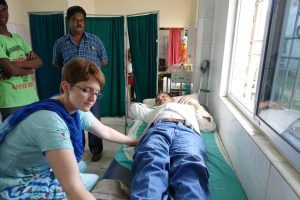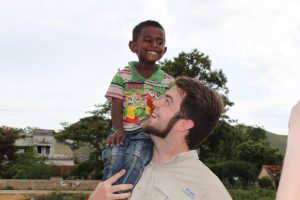Every year but one for the past 13, Dr. Maureen Raffensperger, director of the physical therapist assistant (PTA) program, has traveling half a world away to utilize her physical therapy skills and quietly make a difference in India.
After finding out about Good Shepherd Hospital in Puttur, Andhra Pradesh through a church in St. Joseph, Dr. Raffensperger first traveled there in 2008 with Kelly Kloepping ’07 and set up the physical therapy clinic. Every time she has gone since, she has taken along students or alumni of the PTA program to work in that clinic.
Last year, she traveled with two alumni, Crystal Coakley ’15 and Sam Goodroad, who graduated from the PTA program in 2012 and with a biology degree in 2015. Also in their group was Jeremy Burleson, clinic manager and prosthetist at Hanger Clinic in St. Joseph. It was the second trip for Coakley, who had gone as a student in 2014.
Goodroad, who plans to continue his education to become a prosthetist, saw patients at the clinic but also helped Burleson measure and create prosthetics. The original plan, Goodroad said, was to make the prosthetics while they were in India. But the country’s unstable electricity and lack of quality equipment proved a challenge. The group ended up making casts and producing the prosthetics back in the United States.
Dr. Raffensperger said India’s lack of facilities and equipment is always a challenge that forces you to be creative, but that makes for a great learning experience for the travelers.
Another benefit for those who go, she said, is that they see patients with problems that are extremely
rare in the United States. “They also gain a firsthand knowledge of Indian culture and learn a lot about themselves and how they handle stress.”
Coakley said she also learned how to explain things in a way that her patients could understand. Since she was speaking to them through a translator, she had to make her explanations very clear, she said.
This trip, working with those who needed prosthetics was fulfilling, Coakley said, because in India, amputees are ostracized. “Just the fact that we touched them and treated them like normal human beings made a difference,” she said.
Dr. Raffensperger said she keeps in touch with those who run the clinic several times throughout the year and they feel like family. “I have learned a lot from them professionally, and I am much more open minded now.”
“The trip was a blessing,” Goodroad said. “You think you’re going to help people in need, but they made a big impression on me and helped me. Everyone was so friendly and welcoming.”
He and Coakley both said they would like to return to India with Dr. Raffensperger. And it’s a pretty safe bet that Dr. Raffensperger will return again, making connections and a difference.


